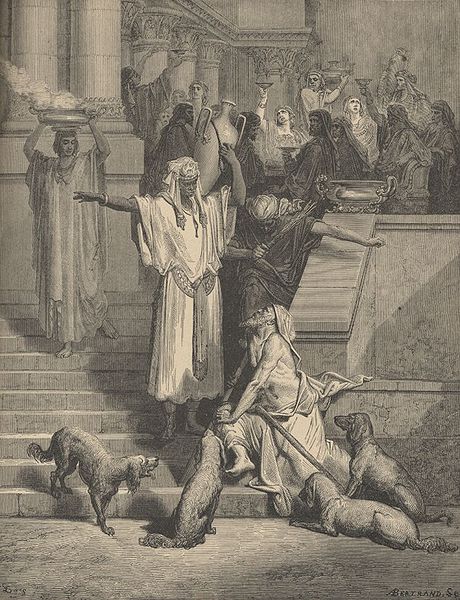 Today’s gospel of the Rich Man and Lazarus is so powerful, I could write probably for hours on its message. Jesus clearly constructs a narrative that speaks on various levels. He communicates a character in both the rich man and Lazarus that is worth studying in any creative writing class. However, there is an important lesson for us today.
Today’s gospel of the Rich Man and Lazarus is so powerful, I could write probably for hours on its message. Jesus clearly constructs a narrative that speaks on various levels. He communicates a character in both the rich man and Lazarus that is worth studying in any creative writing class. However, there is an important lesson for us today.
It has an important relevance for us because it is talking to us about being mindful of the poor at a time when the concept of social justice is being politically manipulated by one political group and rejected by another in our country. In the middle is the truth that our treatment of the poor is one standard by which we are judged.
Let me give you an example. Today there is a common cry against the legalization of certain sexual activity such as homosexual marriage. The cry is that this which is now considered acceptable in various countries in the Americas and the world is an abomination to God and it must be rejected. However, no one uses those terms to describe the economic sins that are also abominations to God according to the Old Testament. Recently, for example, an Episcopal priest explained on a US television news program that he was paying thirty-percent interest on his credit card. Charging any form of interest is described as an abomination, thirty-percent is clearly over the top. However, this is as grave a sin as any sexual sins now legalized in various countries.
If you look at the end of the first reading you see an attitude in God’s words to his sinful people that they will experience his wrath. However notice the tone of this words, they are almost matter-of-factly spoken. He no longer talks about repentance, because they refuse to repent. Instead He says simply. “Their wanton revelry shall be done away with.” Good-bye. Their sins are identical to those of the rich man, living lavishly while the poor suffer.
I had an interesting experience here in Massachusetts in which a priest from Central America came to visit some of his diaspora here in Massachusetts. While visiting one of our richer water front communities, he came upon a five million dollar house. He was dumb-founded. He asked me when he returned to this parish (where you will not find a five million dollar house) how someone could live like that when there are so many poor in the world, including his home country. My response was shocking to him. I told him that he saw the summer house, there is probably a house worth three times that one elsewhere in the US which is the winter house.
In today’s gospel, notice a message that is similar to the matter of fact statement we see in the first reading. Contrast the description of Lazarus’ death to the rich man’s death: “When the poor man died,
he was carried away by angels to the bosom of Abraham. The rich man also died and was buried.”
It is that same matter of fact statement of disposal of he who is now disposable. Good-bye.
 How did he get that way? By thinking only of himself and not of Lazarus. Notice too that the rich man calls Abraham his Father, so he clearly considered himself a good Jew of some form, but Jesus indicates he was anything but.
How did he get that way? By thinking only of himself and not of Lazarus. Notice too that the rich man calls Abraham his Father, so he clearly considered himself a good Jew of some form, but Jesus indicates he was anything but.
Our mindfulness of the poor is an essential element of what it means to be Catholic. The confusion in various countries today is that there are those that are using the obligation to be mindful of the poor as a form of political manipulation.
So they are describing mindfulness of the poor as a source of taxation. Whether that is proper or not is something to address in another forum. Our focus today is our personal mindfulness of the those less fortunate. This is why some people are rejecting the words social justice. However, there is form of social justice that is an essential element of our faith. It is how you and I act towards the poor. If we ignore that responsibility we are considered an abomination to God.
There is a fascinating story happening in various parts of the world today which is paralleled in the Book of Kings. Companies in union with certain governments are approaching landowners demanding to see the deed to the land. The land has been in the family for centuries and the deed is long lost. The government then declares that since their is no deed the land belongs to the government which then turns around and sells it to the company that engages in industrial farming. The family loses their farm with no compensation.  It was this dynamic that was a main factor in the Salvadoran Civil War. One such company by the way, is one whose brand you see every time you walk into a supermarket.
It was this dynamic that was a main factor in the Salvadoran Civil War. One such company by the way, is one whose brand you see every time you walk into a supermarket.
In the book of Kings, King Ahab and Queen Jezebel use false accusations to destroy a man’s reputation and life so that they could take his farm. It is a similar dynamic. Elijah the prophet curses them with one of the worst curses in the bible: Dogs will lick up your blood. Ahab repents by the way, Jezebel does not and when she dies, dogs lick up her blood.
Our mindfulness of the obligations to the less fortunate are cited as an essential element of our Christian faith. If we choose to ignore them we can find ourselves like the man who ended up at the gates of Heaven. St. Peter asks him if he has done anything charitable in his life. He thinks hard and finally realizes that two weeks earlier he gave a homeless woman a nickel. St. Peter asks him to think of anything else. He thinks hard and realizes that about a year ago he gave another homeless person a nickel. He could think of nothing else. St. Peter not knowing how to handle the case calls St. Joseph and tells him of the man’s two charitable acts. He asks St Joseph what he should do with the man.
St. Joseph replies, “Aw, give him back his dime and tell him to go to Hell.”
photo credit:
Top: Gustav Dore Lazarus and the Rich Man public domain
Middle: Hermano Leon
Bottom: MUGS (Wikimedia) Creative Commons Attribution 3.0 Unported License Wikimedia

